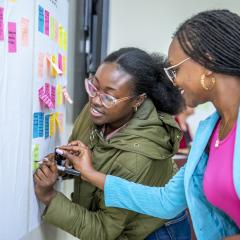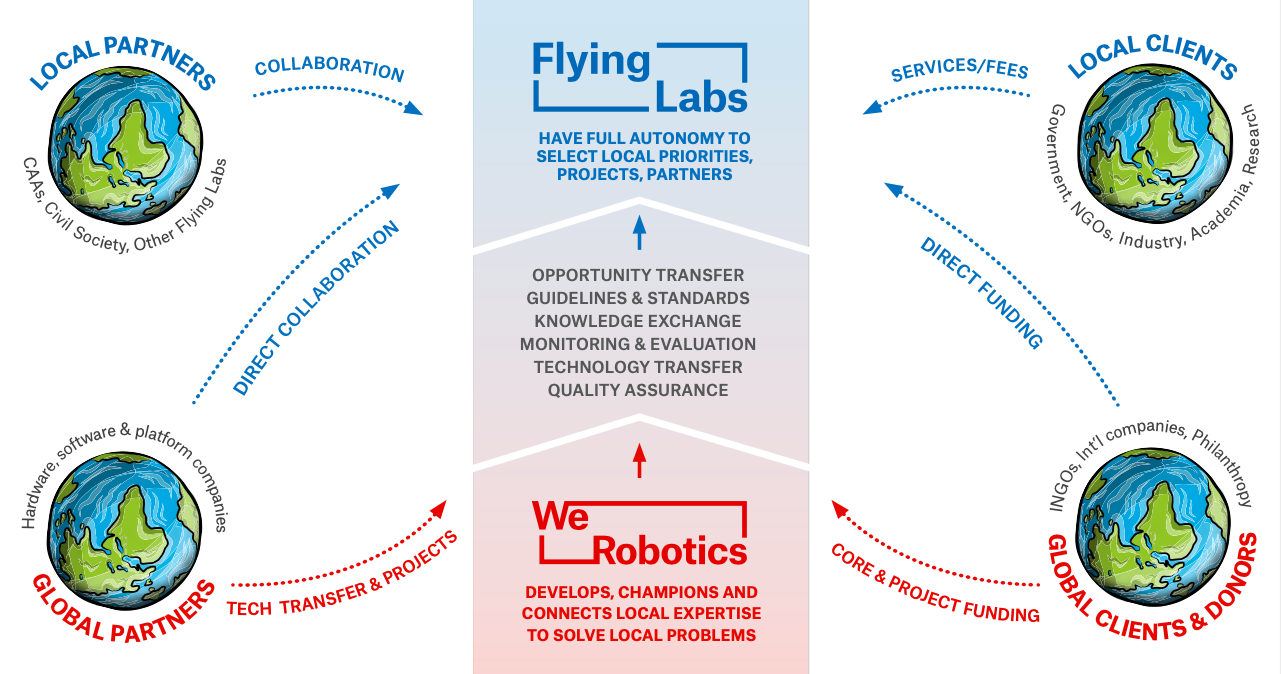
Shifting the Power: Yes, Flying Labs Really Are Different. Here’s How.
September 16th, 2020

Flying Labs are independent knowledge hubs that are led by local experts and hosted by independent local organizations. These organizations are typically local nonprofits, startups, companies, or universities. Flying Labs thus depend on existing local expertise since these experts and organizations are the ones co-creating, leading, and hosting their own Flying Labs. They are proof that local expertise already exists. Furthermore, the model developed to co-create Flying Labs continues to be co-created with local experts across multiple Flying Labs in Africa, Asia, Latin America, and beyond.

Flying Labs can have full-or-part-time dedicated staff, e.g., seconded from hosting organizations and their local partners. This staff is entirely local. No foreigners are running these labs in-country or remotely. The identity and visibility of the local organizations that host Flying Labs are amplified when they join the network of Flying Labs. To be sure, local talent, organizations, and companies that form part of Flying Labs are actively promoted and supported rather than subsumed and assimilated. What's more, these hosting organizations often chose to co-brand relevant projects to promote their organizations and their Flying Labs. This builds their credibility and visibility, both locally and internationally. Note that Flying Labs choose their projects and partners.
Flying Labs are also financially sustainable and independent when they join the Flying Labs network. How is this possible? Because they are hosted and coordinated by existing, independent local organizations with a demonstrated track record. They already have their own offices, partners, clients, projects, and budgets. Like the other defining features described above, this economic independence makes Flying Labs very different from the kinds of initiatives and models that permeate the social good space. Flying Labs serve as highly strategic "boosters" for hosting organizations and local expertise. They help to level the playing field by shifting power with local experts. By coordinating their Flying Labs, host organizations drive more visibility and opportunities to their own expertise and services.
The role of WeRobotics within the Flying Labs network also differentiates Flying Labs from traditional social good organizations. WeRobotics is a nonprofit organization that serves and supports Flying Labs. WeRobotics drives new opportunities, requested skills, projects, prospective partners, innovative technologies, funding, and visibility to local experts across Flying Labs. The hosting organizations then decide for themselves whether they are interested (and have time) to pursue these opportunities. There is zero obligation for them to take on said opportunities. When Flying Labs turn down a project, we/they contact other local partners and experts who may be interested in taking on said project. In some cases, the project can be moved to neighboring countries whose Flying Labs are keen to take on that project.
If WeRobotics were a “typical” international organization, it would be headquartered in the Global North. But WeRobotics has no headquarters because the very idea of foreign-based headquarters is self-centered, top-down, and thus problematic. WeRobotics aims not to grow WeRobotics but instead to support local experts through the Flying Labs network and beyond, to expand their expertise and opportunities based on their priorities, and respond to their demand for Flying Labs. In short, it's not about WeRobotics and all about local experts. If WeRobotics were a typical international organization, it would have established country offices staffed by full-time WeRobotics employees. These country offices in Africa, Asia, and Latin America would be led in-country by foreign experts, typically from the "Global North." These country offices would not operate independently from WeRobotics since these offices' very purpose would be to implement WeRobotics activities, and exclusively so. What's more, if WeRobotics were like other organizations, it would not shift power to country offices, let alone co-create an independent local entity with country-offices to take over from WeRobotics.

The reality is that WeRobotics is working with independent Flying Labs to co-create FlyingLabs.org as a separate local entity. This independent entity will be deeply rooted in the "Global South" and led entirely by local experts, just like individual Flying Labs. FlyingLabs.org will take over from WeRobotics in order to take the Flying Labs network to the next level. WeRobotics is actively facilitating this transition to FlyingLabs.org, a process that has already begun. As part of this process, WeRobotics is returning to its original motivation for the co-creation of Flying Labs: systems change.
This explains why WeRobotics is fully documenting the Flying Labs model based on 5 years of learnings in preparation for an open and practical handbook. The Flying Labs model is a guide for other like-minded organizations who seek to accelerate their impact by shifting power with local experts and local organizations. WeRobotics is thus working to enable the adoption of the Flying Labs model at scale to drive systems change by shifting power with all local experts. We've already been approached by several organizations (some in very different sectors) for insights on the Flying Labs model because these organizations are keen to adopt an entirely new and very different model to drive their impact.
In sum:
- Different doesn't mean perfect
- Flying Labs are continuing to evolve
- Flying Labs represent a very different model
Recent Articles

